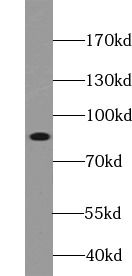Products
STAT3 antibody
Category:
Research Area:
- SPECIFICATIONS
- Product Name
- STAT3 antibody
- Catalogue No.
- FNab08298
- Size
- 100μg
- Form
- liquid
- Purification
- Immunogen affinity purified
- Purity
- ≥95% as determined by SDS-PAGE
- Clonality
- polyclonal
- Isotype
- IgG
- Storage
- PBS with 0.02% sodium azide and 50% glycerol pH 7.3, -20℃ for 12 months (Avoid repeated freeze / thaw cycles.)
Immunogen
- Immunogen
- signal transducer and activator of transcription 3 (acute-phase response factor)
- Alternative Names
- Acute phase response factor antibody, APRF antibody, HIES antibody, STAT3 antibody
- UniProt ID
- P40763
- Observed MW
- 85 kDa
Application
- Tested Applications
- ELISA, WB, IHC, IF
- Recommended dilution
- WB: 1:200 - 1:500; IHC: 1:50 - 1:200; IF: 1:10-1:100
Validated Images
 HeLa cells were subjected to SDS PAGE followed by western blot with FNab08298(STAT3 antibody) at dilution of 1:300
HeLa cells were subjected to SDS PAGE followed by western blot with FNab08298(STAT3 antibody) at dilution of 1:300
 Immunohistochemistry of paraffin-embedded human breast cancer slide using FNab08298( STAT3 Antibody) at dilution of 1:50
Immunohistochemistry of paraffin-embedded human breast cancer slide using FNab08298( STAT3 Antibody) at dilution of 1:50
 Immunofluorescent analysis of HeLa cells using FNab08298 ( STAT3 Antibody) at dilution of 1:25 and Rhodamine-Goat anti-Rabbit IgG
Immunofluorescent analysis of HeLa cells using FNab08298 ( STAT3 Antibody) at dilution of 1:25 and Rhodamine-Goat anti-Rabbit IgG
- Background
- The protein encoded by this gene is a member of the STAT protein family. In response to cytokines and growth factors, STAT family members are phosphorylated by the receptor associated kinases, and then form homo- or heterodimers that translocate to the cell nucleus where they act as transcription activators. This protein is activated through phosphorylation in response to various cytokines and growth factors including IFNs, EGF, IL5, IL6, HGF, LIF and BMP2. This protein mediates the expression of a variety of genes in response to cell stimuli, and thus plays a key role in many cellular processes such as cell growth and apoptosis. The small GTPase Rac1 has been shown to bind and regulate the activity of this protein. PIAS3 protein is a specific inhibitor of this protein. Mutations in this gene are associated with infantile-onset multisystem autoimmune disease and hyper-immunoglobulin E syndrome. Alternative splicing results in multiple transcript variants encoding distinct isoforms.



